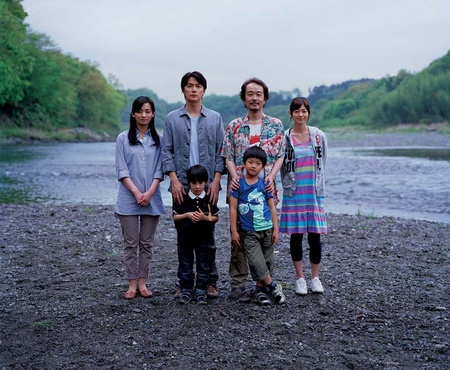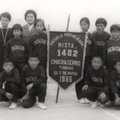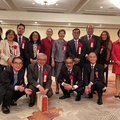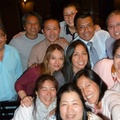Almost seven years in Japan. Sufficient time to learn Japanese. I didn’t learn it well; just enough to get by on a day-to-day basis. In truth, you don’t need to learn it. We didn’t need to learn it. In those times (the beginning of the 1990s), we Peruvians had an interpreter for everything: to solve a problem at work, to renew the visa, or go to the doctor. In the stores I was able to reach and take what I wanted from the shelves and then head to the cashier. In restaurants I was able to open the menu and point to what I wanted to eat. It wasn’t even necessary to open my mouth to place an order!
Perhaps the silliest excuse that I had to not learn Japanese was that we were simply visiting Japan for one or two years and then returning to Peru. Why learn the language? Another odd reason that a friend of mine gave was that he had a mental block, that he just couldn’t learn it…similar to the body rejecting a new part.
Almost seven years in a bubble. Physically speaking, I was in Japan, but my head and heart were in Peru. Nostalgia reinforces the connection to one’s country. The farther away you are, the closer you seem. You live in Japan but you work with Peruvians, you socialize with Peruvians, you play soccer with them (or something that resembles soccer) with Peruvians. Japan only provided the setting. And the Japanese people themselves? They were extras on the set…shadows, ghosts.
Leisure time. If you stayed home, you would watch videos rented from the local store. On T.V. you might watch sitcoms, sports, politics, soap operas. All Peruvian. Movies—the usual from Hollywood. Almost seven years and I didn’t see any Japanese movies.
One day you discover in the Kinokuniya bookstore (in Shinjuku) a small space for Spanish-language books. It was like discovering oil. There I found one of the books from the series Contra viento y marea (Come Hell or High Water) by Mario Vargas Llosa. It opens the mind. A light went on where there was no light. In another bookstore (also in Tokyo) called Manantial, you found Prosas apátidas (Stateless Prose) by another Peruvian, Julio Ramón Ribeyro. It, too, was enlightening.
In Japan you read more books written by Peruvian authors than when you were in Peru. You find yourself waiting for the release of something new written by Mario Vargas Llosa or Alfredo Bryce Echenique. You read a few Japanese novels but only because a friend let you borrow them, for example, The Dam or A Personal Question by Kenzaburo Oe who was just awarded the Nobel Prize. Out of sheer curiosity you find yourself wanting to know more about an author of whom you knew nothing before.
You visited neither Mount Fuji nor the Kyoto Temple, not even the Imperial Palace. Forget about Tokyo Disney. And it was so easy to do too; you only had to hop on a train. You preferred to watch videos or perhaps go to a party hosted by Peruvians where you could dance Peruvian style—the Meneíto or the Macarena, among others.
What about Japanese food? Nope. Peruvian meals at home. When out and about, you went to restaurants that served international cuisine and all meat. Or you went to McDonalds. Peruvian restaurants. You almost never ate sushi, but you got your fair share of lomo saltado (Peruvian beef stir fry).
When were the elections in Japan? Who was the first prime minister? You don’t know these answers but you don’t care. But if these questions were being asked of you in relation to Peru and President Alberto Fujimoro’s reelection, you would know how to respond.
You spend almost seven years in the country of your maternal and paternal grandparents and nothing interests you about the culture, its people, the language, its attractive tourist spots, or its history. Nothing. Why? Perhaps because you never felt more Peruvian than in those seven years in Japan, and you believe that the farther you are away from Japan the closer you are to Peru. If you get too close to Japan, you feel that you are betraying Peru. Of course, you think now “How silly!”
You also don’t feel like a Nikkei Peruvian; rather, you feel just like a Peruvian because you are above ethnic origins and surnames and the rest of it.
Everything changed in Peru. You discover that Takeshi Kitano wasn’t just some two-bit comic on T.V. (as you thought when you were in Japan), but he also was a great film maker. Since finding this out, you have watched almost all of his movies. You also finally watched movies by Akira Kurosawa and Yasujiro Ozu. You discover Hirokazu Koreeda and he becomes one of your favorite directors.
In Peru, you finally read such authors as Yasunari Kawabata, Yukio Mishima, and Natsume Soseki. You discover Hiromi Kawakami, Natsuo Kirino, and Keigo Higashino. Above all, you read for the first time Tokyo Blues by Haruki Murakami. And just like when you were still in Peru where you kept up with what Vargas Llosa was writing, you do the same with Murukami (although now each time with less enthusiasm because it takes longer to digest so many stories with talking cats and small creatures that crawl out of a child’s mouth).
You no longer watch comedies, sports, or Peruvian entertainment on television because you prefer to invest your time enjoying, for example, Shall We Dance, which you ignored when you lived in Japan.
In terms of Japanese history, you only knew what they taught you in school: atomic bombs being dropped over Hiroshima and Nagasaki. In Japan, you could have visited the Hiroshima Museum of Peace; while in Okinawa, you could have discovered (but you didn’t at the time) that it was the site of the one of the most ferocious battles of World War II. Now you read about it in books that you seek out because you want to learn more about Japan’s role in the war and the accompanying horrors of that conflict.
What caused such a leap from indifference to keen interest in Japan? Perhaps time, distance, the years, etc., have opened my eyes, expanded my horizons, and freed me from the intellectual ghetto. In the process, I learned that Japan has so much to offer.
To wrap up, the best thing about it all is that there are many Japanese authors, filmmakers, and stories that are waiting to be known. No longer is Japan a foreign country but rather a fascinating world to be discovered.
© 2014 Enrique Higa






